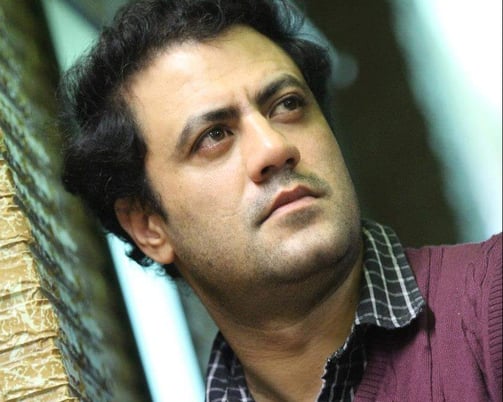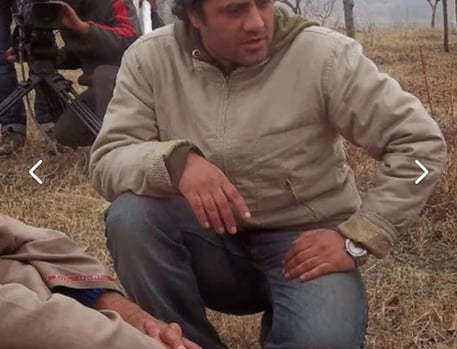Cinematic Journey
Ali Emran: A Filmmaker
Hailing from the heart of Kashmir, Ali Emran has emerged as a distinguished filmmaker, blending the philosophical and the emotional in his cinema. Since his debut in 2006, Emran has steadily built a reputation as one of Kashmir’s most innovative and profound cinematic voices, engaging audiences with stories that resonate long after the final credits roll. His films transcend traditional boundaries, turning them into immersive explorations of both the personal and the universal.
Emran’s first step into filmmaking came with the experimental short film The Ninth Act (2006), which delved into the impact of globalization on downtown Srinagar. The film's unique blend of documentary realism and narrative storytelling set Emran apart as a director unafraid to tackle pressing socio-economic transformations. This debut marked the beginning of a career centered on exploring complex themes with a delicate yet impactful approach.
His breakthrough came with the Kashmiri-language feature film Qouluf, The Ensorcelled, a spiritual journey set against the backdrop of Kashmir’s mystical traditions. The film, which examines a man’s internal and external quest for meaning, reflects the philosophical depth that has come to define Emran’s work. It made cinematic history by being the first Kashmiri-language feature film to be screened in a cinema hall in Kashmir in over 60 years. Qouluf was featured at prestigious festivals, including the Kolkata International Film Festival and India Habitat Centre Film Festival, solidifying Emran’s role in bringing Kashmiri culture to the forefront of contemporary cinema.
In 2012, Emran ventured into new territory with Ibtida, The Beginning, an Urdu-language adaptation of Ayn Rand’s The Fountainhead. Set in the context of Kashmiri society, this bold reinterpretation of Rand’s exploration of creativity and individualism asked difficult questions about the interplay between tradition and conflict. Ibtida was screened at major film festivals, affirming Emran's place in independent cinema as a filmmaker unafraid to confront the tension between personal freedom and societal expectations.
Emran’s latest feature, Baand, The Musical Journey of an Artist, slated for release in 2024, is a heartfelt tribute to Baand-e-Pather, Kashmir’s endangered folk theater tradition. The film offers more than just a window into cultural preservation; it is an ode to the resilience of Kashmiri artists fighting to keep their heritage alive in a rapidly modernizing world.
Beyond feature films, Emran’s body of work also includes short films and documentaries, which showcase his versatility. Know Me (2014), an experimental short selected for competition at the Mumbai International Film Festival, explores self-realization through minimalist storytelling, challenging traditional cinematic structures. His documentary Baand-e-Jashn (2014) continues his commitment to preserving Kashmiri folk traditions, reflecting a deep sense of cultural responsibility that permeates his work.
In 2015, Emran released Tasavuf, a documentary that examined Sufism’s deep roots in Kashmir. Through intimate, thoughtful storytelling, the film brought viewers closer to the region's spiritual heritage, serving as both a cultural record and a cinematic experience.
His forthcoming documentaries, Jesus & Kashmir and End Time Priest-King, both slated for release in 2024, promise to push the boundaries of research-based filmmaking. Jesus & Kashmir explores the controversial theory of Jesus Christ's possible presence in Kashmir, while End Time Priest-King investigates religious prophecies shared across different faiths. These projects are expected to cement Emran’s reputation for combining historical scholarship with captivating cinematic narratives.
Emran’s contribution to the arts extends beyond cinema, with an impressive resume in theater direction and choreography. His choreographed musical play Dream Sellers was staged at the prestigious Stein Auditorium in New Delhi, showcasing his ability to seamlessly blend music, movement, and narrative. His adaptation of Agha Shahid Ali’s celebrated poetry collection, The Country Without a Post Office, was brought to life at the Kamani Auditorium in New Delhi, and further underscored his gift for literary adaptation.
His versatility as a theater director was further demonstrated in productions like The Witches of Macbeth and Toba Tek Singh, the latter a satirical adaptation of Saadat Hasan Manto’s iconic story. Whether it is through classical literary works or contemporary socio-political commentary, Emran’s theater work reflects his intellectual rigor and cultural sensitivity.
As a filmmaker, Ali Emran’s work is marked by an emotional depth and philosophical inquiry that few achieve. His films and stage productions provide a mirror to society, reflecting not only the personal struggles of his characters but also the broader socio-political realities of Kashmir.
With upcoming projects like Arni-Rang, a feature film that celebrates diversity and unity, Ali Emran’s creative journey continues to evolve. His work remains a powerful exploration of the human condition, steeped in Kashmiri culture yet universal in its reach. Through cinema, Emran’s storytelling continues to challenge audiences to think deeply, question assumptions, and engage with the complex layers of identity and tradition.


Cinematic Journey
Explore Ali Emran's profound films that resonate with universal emotions.








Get in Touch with Ali
Reach out for collaborations or inquiries about my films.


Vision
Ali Emran: Crafting cinematic stories from Kashmir.
© 2024. All rights reserved.
